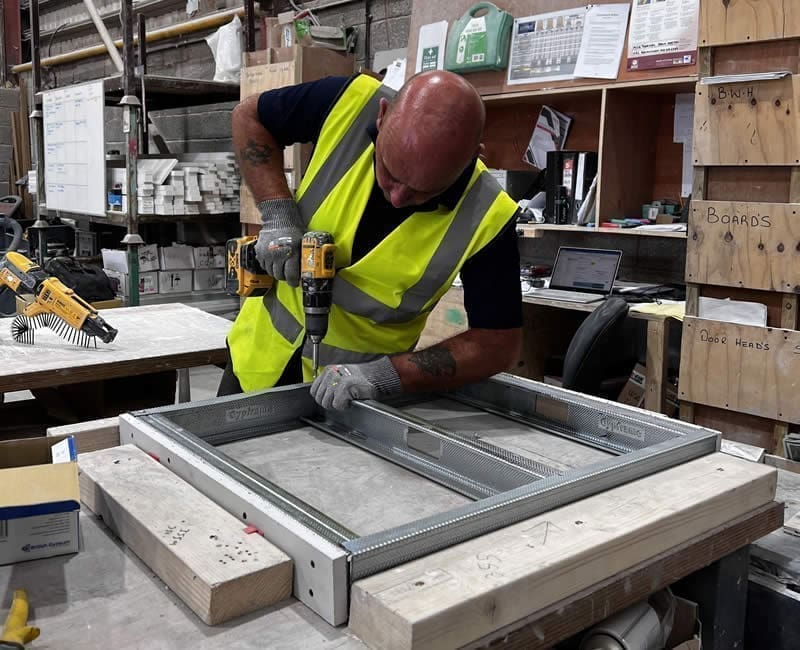Offsite drywall production is rapidly becoming a game-changer in the construction industry, particularly for large-scale projects such as commercial buildings, stadiums, universities, and residential blocks. The traditional on-site approach to drywall construction, although effective, can be time-consuming, expensive, and subject to errors. However, prefabricated, offsite drywall production offers a streamlined alternative that saves time, reduces costs, and guarantees higher quality. In this blog, we will explore how offsite drywall production transforms large-scale construction projects by discussing the key benefits of time savings, cost efficiency, and enhanced quality.
The Shift to Offsite Drywall Production
The construction industry has been evolving steadily, with offsite manufacturing rising to prominence due to its numerous benefits. For drywall production, offsite manufacturing refers to the process of fabricating components like drywall boards, door sets, deflection heads, and builders’ work openings in a controlled factory environment. Once completed, these components are delivered to the construction site for quick and efficient installation.
This approach contrasts with the traditional method, where drywall materials are brought to the site in bulk, cut, and installed onsite. Offsite drywall production aims to eliminate on-site inefficiencies, ensuring better project timelines, cost control, and quality assurance.
Why the Shift Matters
For construction managers and project leaders, efficiency, accuracy, and budget control are vital. Offsite drywall production provides a solution that addresses common pain points, making it particularly beneficial for large-scale projects.
Time Savings in Offsite Drywall Production
Prefabrication for Speed
Time is one of the most valuable resources in any construction project. One of the standout advantages of offsite drywall production is the significant reduction in time spent on site. Prefabricated drywall components, such as pre-cut boards, builders work openings, and door sets, are produced offsite and delivered ready for installation. This saves time by removing the need for on-site cutting, measuring, and adjustment.
Additionally, prefabricated drywall components can be installed quickly due to their precise dimensions and pre-engineered design. This drastically reduces installation time, allowing project managers to meet tight deadlines without sacrificing quality. For large-scale projects, where timing is critical, this can translate to finishing weeks or even months ahead of schedule.
Consistency in Delivery
Another key time-saving benefit is the consistency of delivery. Offsite production operates on a just-in-time (JIT) delivery system, where materials are fabricated and delivered exactly when they are needed. This ensures that there are no delays waiting for materials, and it eliminates the risk of having too much or too little on hand, both of which can slow down a project.
Case Study: Time Saved in Large Projects
For example, Drywall Pro-Cut’s offsite drywall production was utilised for a large university project in the UK. By prefabricating deflection heads, builders work openings, and other drywall components, the project saved an estimated 20% of time compared to traditional methods. This time saving allowed the project to complete earlier than planned, enabling the university to open its doors ahead of schedule.
Cost Efficiency with Offsite Drywall Production
Reduced Labour Costs
Labour costs are one of the most significant expenses in construction. Traditional drywall installation is highly labour-intensive, requiring a large workforce for tasks like measuring, cutting, and fitting drywall components on site. Offsite production simplifies this process by delivering pre-cut, ready-to-install components, which significantly reduces the number of workers needed for installation.
With fewer workers required on site, project managers can allocate resources more efficiently, saving on labour costs. Additionally, offsite production minimises overtime and reduces the risk of delays due to weather or other unforeseen circumstances, further cutting down costs.
Material Efficiency and Waste Reduction
Offsite drywall production also leads to a reduction in material waste. Traditional on-site construction often involves excess material being cut and discarded, contributing to higher costs. By contrast, offsite production allows for precision cutting and optimal material use. The components are produced in a controlled environment where waste is minimised.
For example, Drywall Pro-Cut’s offsite production processes reduce waste by up to 15%, resulting in fewer materials being transported to and from the site. This not only saves money on materials but also reduces the need for waste disposal, which can be costly in large-scale projects.
Fewer Onsite Resources Required
In addition to saving on labour and materials, offsite drywall production reduces the need for other onsite resources. There is less demand for onsite storage space, fewer vehicles required for material transport, and a reduction in equipment and machinery costs. For project managers overseeing commercial developments or large residential complexes, these savings can be significant.
Case Study: Cost Savings in a Commercial Project
One of Drywall Pro-Cut’s commercial projects involved the construction of a large office building. By utilising offsite drywall production, the project saw a 12% reduction in overall costs. We achieved this through labor savings, reduced material waste, and minimised onsite resource requirements. We then passed these savings onto the client, helping keep the project within budget and reinforcing the value of offsite construction.
Quality Assurance in Prefabricated Drywall Components
Precision Manufacturing for Consistency
One of the most important benefits of offsite drywall production is the superior quality it offers. In a factory setting, every drywall component is produced under strict quality control measures, ensuring consistent accuracy and precision. This eliminates the inconsistencies often seen with on-site construction, where environmental factors and human error can lead to defects.
Factory-Controlled Environment
We manufacture offsite drywall components in a controlled environment where we regulate temperature, humidity, and dust. This process ensures optimal production conditions, safeguarding materials from potential damage or imperfections that on-site storage and handling might cause.
In addition, each component is rigorously tested for structural integrity, fire resistance, and durability before it leaves the factory. This guarantees that the drywall components meet the required standards and specifications, providing project managers with peace of mind that their installations will be long-lasting and reliable.
Enhanced Safety Standards
By producing drywall components offsite, the construction process is safer for workers. The factory environment is specifically designed for manufacturing, with safety protocols in place to protect workers from the hazards often encountered on construction sites. For example, there is no need to use sharp tools on site or expose workers to dust and debris, reducing the risk of injury.
The Role of Offsite Drywall Production in Large-Scale Projects
Commercial Drywall Manufacturing
For large commercial projects such as office blocks, factories, and stadiums, offsite drywall production offers a reliable solution that enhances productivity while maintaining high standards of quality. These large-scale projects often involve complex designs, large volumes of materials, and strict timelines. Offsite production allows project managers to handle these challenges with ease by providing ready-made components that can be installed quickly and efficiently.
By choosing offsite production, commercial contractors gain cost predictability since we produce prefabricated drywall components to specification, eliminating the risk of onsite errors. This streamlines the construction process, ensuring timely and on-budget project completion.
Prefabricated Drywall for Large Projects
Large-scale projects require substantial volumes of materials, and managing the logistics can be overwhelming for project managers. Offsite drywall production simplifies the process by delivering prefabricated components in batches, reducing the need for excess storage on-site and preventing logistical bottlenecks.
Additionally, prefabricated drywall components are produced in compliance with building regulations, fire safety standards, and acoustic performance requirements. This ensures that large projects adhere to all necessary codes while benefiting from the streamlined processes of offsite production.
Case Study: Stadium Construction Using Offsite Drywall Production
In a recent stadium construction project, Drywall Pro-Cuts offsite drywall production helped deliver over 10,000 square metres of prefabricated drywall panels. The project saved 25% on labour costs and reduced installation time by 30%. Moreover, by producing the components in a factory setting, the project saw fewer defects and rework, contributing to significant cost and time savings.
FAQs
How much time can offsite drywall production save on a large project?
Offsite drywall production can save anywhere from 20% to 30% of the time compared to traditional methods, depending on the project size and complexity.
How does offsite drywall production contribute to cost savings?
Offsite production reduces labour costs, minimises material waste, and requires fewer onsite resources, leading to overall cost reductions of up to 12%.
What are the benefits of offsite drywall production for commercial projects?
Commercial projects benefit from predictable costs, reduced installation time, and compliance with regulatory standards, ensuring a smoother construction process.
Can Drywall Pro-Cut customise components to my project’s needs?
Yes, Drywall Pro-Cut specialises in custom-made drywall components that are tailored to your specific project requirements, ensuring precision and efficiency.
How does offsite manufacturing improve quality control?
Components are produced in a controlled factory environment with strict quality checks. This ensuring accuracy and durability that reduces the risk of onsite defects.
Conclusion
Offsite drywall production offers transformative benefits for large-scale construction projects. This is in particular in terms of time savings, cost efficiency, and quality assurance. By prefabricated drywall components in a controlled environment, project managers can reduce the risks of onsite errors. They can also accelerate installation, and ensure compliance with safety standards. From commercial buildings to residential blocks, offsite drywall production is redefining how large projects are executed.
To explore the benefits of offsite production for your next project,
Visit Offsite Drywall Production and speak with one of our experts today.


